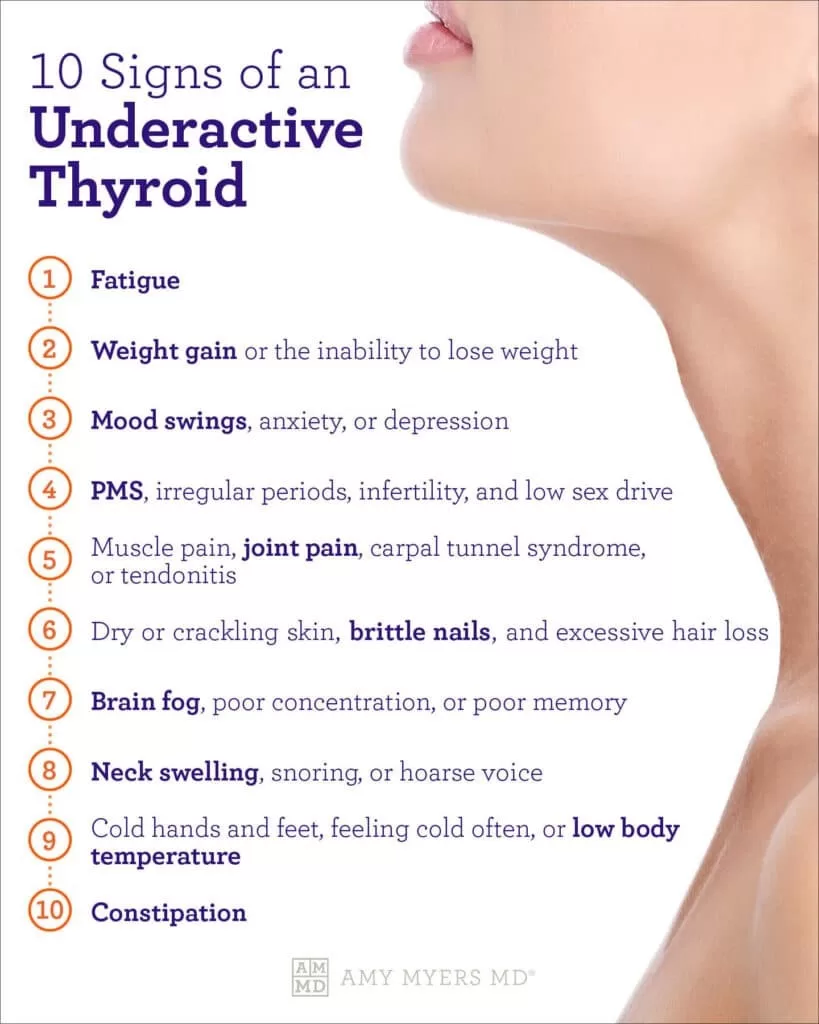Early signs of thyroid problems can manifest in various ways that are often overlooked until they become more pronounced. Approximately one in 20 people in the UK suffers from some form of thyroid disorder, with women being significantly more susceptible. Changes in metabolism brought on by thyroid dysfunction can lead to symptoms of thyroid problems such as fatigue, weight fluctuations, and mood disturbances. Awareness of these early signs, including hypothyroidism symptoms like depression and hyperthyroidism symptoms such as anxiety, is vital for prompt diagnosis and treatment. By understanding the initial indicators of thyroid disease signs, individuals can take proactive steps towards improving their thyroid health.
Recognizing the onset of thyroid dysfunction involves identifying key indicators that signal hormonal imbalance and potential thyroid health issues. Conditions like hypothyroidism, characterized by an underactive gland, and hyperthyroidism, marked by overactivity, can lead to a host of symptoms impacting daily life. Common thyroid issues can result in fatigue, weight changes, and emotional fluctuations, emphasizing the importance of vigilance for anyone who suspects they may be experiencing thyroid-related problems. Informing oneself about the nuances of thyroid function and its associated disorders is pivotal in managing personal health effectively. By staying alert to these signs, individuals can seek early interventions and enhance their overall well-being.
Understanding the Symptoms of Thyroid Problems
Thyroid problems can manifest through a variety of symptoms, making it essential to recognize the early signs of a thyroid problem. These include fatigue, weight changes, and mood fluctuations that can significantly impact your daily life. For instance, individuals with hypothyroidism may experience fatigue and weight gain, while those with hyperthyroidism may face fatigue coupled with unexpected weight loss due to an accelerated metabolism. Knowing these signs can help in seeking timely medical intervention, which is crucial for managing these thyroid conditions.
The symptoms of thyroid issues can often be mistaken for other health problems such as depression or stress, which can delay proper diagnosis and treatment. It’s also important to understand that thyroid disease signs might vary widely from person to person, with some experiencing more pronounced symptoms than others. Regular check-ups and awareness of how your body responds to changes can be pivotal in early detection and effective management of thyroid health.
Recognizing Early Signs of Hypothyroidism
Hypothyroidism occurs when the thyroid gland is underactive and does not produce enough hormones, resulting in classic symptoms such as fatigue, weight gain, and cold intolerance. Early signs of hypothyroidism often include a marked decrease in energy levels, leading to a lethargic feeling that can affect daily responsibilities and overall quality of life. Additionally, individuals may notice changes in their hair, skin, and mood that can signal an underlying thyroid issue.
Distinguishing between normal fluctuations in energy and the early signs of hypothyroidism is important. Symptoms like unexplained weight gain, feeling more sensitive to cold, or experiencing heavier menstrual cycles are vital clues. Recognizing these symptoms early can motivate individuals to seek a medical evaluation, where blood tests can accurately assess thyroid hormone levels. Early intervention with appropriate treatment can restore hormonal balance, significantly improving symptoms and quality of life.
Identifying Early Signs of Hyperthyroidism
Hyperthyroidism, characterized by an overactive thyroid, presents its own set of early warning signs that differ significantly from hypothyroidism. Individuals may experience increased heart rates, unexpected weight loss, and heightened anxiety levels. Symptoms such as excessive sweating, heat intolerance, and tremors also indicate an overstimulation of bodily functions due to excessive thyroid hormones. Recognizing these early signs can lead to prompt medical consultation and management.
Furthermore, because the symptoms of hyperthyroidism can mimic those of anxiety disorders or other physiological conditions, it is essential to differentiate them properly. If you find that symptoms like persistent heart palpitations or difficulty sleeping are coupled with significant lifestyle changes, it may be an indication to speak with a healthcare professional. Early diagnosis and treatment are crucial as untreated hyperthyroidism can lead to serious health complications.
Thyroid Care: Tips for Maintaining Thyroid Health
Maintaining thyroid health involves adopting a lifestyle that supports proper gland function. Nutrition plays a key role in thyroid care, with a diet rich in iodine, selenium, and zinc being imperative for hormone production. Foods such as fish, dairy products, and nuts can significantly contribute to maintaining optimal thyroid function. Moreover, staying hydrated and obtaining sufficient fiber can mitigate some common symptoms associated with thyroid dysfunction.
In addition to dietary considerations, regular exercise can greatly benefit thyroid health by enhancing metabolism and energy levels. Engaging in physical activities like walking, swimming, or yoga may also help alleviate some psychological symptoms associated with thyroid problems, such as anxiety or depression. Remember, managing stress through mindfulness practices can further support hormonal balance and overall health.
When to Consult a Doctor About Thyroid Issues
Recognizing early signs of thyroid problems is the first step towards managing your health effectively. If you experience symptoms such as unexplained fatigue, mood changes, or significant fluctuations in weight, it’s crucial to consult a healthcare provider. Early medical intervention can prevent more severe complications related to thyroid dysfunction. Typically, your doctor will perform blood tests to evaluate hormone levels and provide a diagnosis.
In cases where symptoms are recognized early, treatment options such as medication can effectively regulate hormone levels, thus improving overall well-being. It’s important to keep an open line of communication with your healthcare provider to discuss any changing symptoms or side effects from medication. Early detection and consistent follow-up care are pivotal for successful management of thyroid health.
The Importance of Blood Tests in Thyroid Diagnosis
Blood tests are indispensable in the diagnosis and management of thyroid conditions. Physicians commonly order tests to measure levels of Thyroid Stimulating Hormone (TSH) and thyroid hormones (T3 and T4) to assess how well the thyroid is functioning. Elevated TSH levels could indicate hypothyroidism, while low levels along with elevated T3 and T4 may point to hyperthyroidism. These tests are straightforward and essential for identifying thyroid dysfunction early, allowing for timely treatment.
Beyond initial diagnosis, regular monitoring through blood tests can help track the effectiveness of treatment and adjust medication dosages as necessary. Patients should be proactive in discussing with their doctors how often they should get their thyroid levels checked, particularly if they have experienced symptoms indicative of thyroid issues. Staying informed and vigilant about thyroid health can empower individuals to take control of their wellness.
Understanding the Risk Factors for Thyroid Problems
Awareness of risk factors associated with thyroid problems is crucial for early detection and intervention. Family history, age, and gender play significant roles, with women being at a higher risk of developing thyroid issues. Conditions such as autoimmune diseases, particularly Hashimoto’s and Graves’ disease, are strongly linked to thyroid dysfunction. Understanding these risk factors can help individuals recognize symptoms and encourage family members to monitor their thyroid health.
Additionally, environmental factors such as exposure to radiation or certain medications may increase the likelihood of developing thyroid problems. Staying informed about these risk factors can lead to a proactive approach, including regular check-ups and blood tests, to assess thyroid function. By being aware of personal and familial health histories, individuals can make informed decisions to maintain their thyroid health.
Lifestyle Adjustments for Effective Thyroid Management
Lifestyle adjustments can significantly influence thyroid health, particularly for those diagnosed with thyroid dysfunction. Incorporating foods rich in essential nutrients such as iodine, selenium, and vitamins into your diet can enhance the overall function of the thyroid gland. For instance, incorporating sea vegetables, eggs, and legumes into meals can provide the necessary nutrients to support hormone production. Additionally, reducing processed foods and sugars can help maintain stable hormone levels and prevent symptoms from escalating.
Moreover, managing stress through activities like yoga, meditation, or regular physical exercise can play a crucial role in thyroid management. Hair loss, fatigue, and mood swings often accompany thyroid issues, and stress reduction techniques can mitigate these symptoms. By prioritizing a balanced lifestyle, individuals can support their thyroid health and improve their overall quality of life.
The Connection Between Thyroid Function and Mental Health
The thyroid gland not only influences physical health but also has profound implications on mental well-being. Those suffering from hypothyroidism often report an increase in depressive symptoms, mood swings, and fatigue, all of which can significantly impair daily functioning. It’s crucial to recognize that changes in thyroid hormone levels can lead to significant mood alterations, manifesting as anxiety, irritability, and depression in some individuals with hyperthyroidism.
Identification of this connection is essential for treating both thyroid conditions and accompanying mental health challenges effectively. Ensuring proper management of thyroid hormone levels through medication and lifestyle modifications can alleviate not only physical symptoms but also improve mental health quality. It’s vital for individuals to communicate openly with their healthcare providers about any mental health changes alongside physical symptoms to create a comprehensive treatment approach.
Frequently Asked Questions
What are the early signs of thyroid problems related to hypothyroidism symptoms?
The early signs of thyroid problems, particularly hypothyroidism symptoms, include unexplained fatigue, weight gain, increased sensitivity to cold, and mood fluctuations. Additional signs may be dry skin, coarser or thinning hair, muscle and joint pain, and heavy or irregular menstrual periods in women.
How can I identify early signs of thyroid problems associated with hyperthyroidism symptoms?
Early signs of thyroid problems related to hyperthyroidism symptoms include difficulty sleeping, rapid heartbeat, increased appetite, and unexplained weight loss. Other symptoms may include excessive sweating, sensitivity to heat, tremors, anxiety, and irregular periods in women.
Are there specific thyroid disease signs to watch for when considering thyroid health tips?
Yes, specific thyroid disease signs include mood changes, fatigue, weight fluctuations, and changes in skin or hair health. Incorporating thyroid health tips such as regular check-ups, a balanced diet, and managing stress can help monitor and maintain thyroid function.
What does the presence of symptoms of thyroid problems indicate about my thyroid health?
The presence of symptoms of thyroid problems, such as changes in energy levels, mood, weight, and metabolism, may indicate an underlying thyroid condition like hypothyroidism or hyperthyroidism. It is essential to consult a healthcare provider for proper diagnosis and management.
When should I seek help for early signs of thyroid problems?
You should seek help for early signs of thyroid problems if you experience symptoms like fatigue, weight gain, increased heart rate, or mood swings. Early intervention is critical for managing thyroid health effectively.
What are common symptoms of thyroid problems in women to be aware of?
Common symptoms of thyroid problems in women include irregular menstrual periods, unexplained weight changes, mood swings, and fatigue. These symptoms are crucial indicators of potential thyroid dysfunction requiring medical evaluation.
Can lifestyle changes help address early signs of thyroid problems?
Yes, lifestyle changes such as maintaining a healthy diet, regular exercise, and managing stress can positively impact thyroid health and may alleviate some early signs of thyroid problems. However, medical intervention is typically necessary.
What should I do if I notice early signs of thyroid problems?
If you notice early signs of thyroid problems, such as unexplained fatigue, weight changes, or changes in mood, consult your healthcare provider. They can perform tests to diagnose any thyroid issues and suggest appropriate treatment.
| Condition | Early Signs |
|---|---|
| Hypothyroidism | – Unexplained fatigue – Slower-than-usual heartbeat – Unexplained weight gain – Increased sensitivity to cold – Constipation – Changes in skin and hair – Mood fluctuations – Heavier or irregular periods in women – Reduced appetite – A hoarser voice – Muscle and joint pain |
| Hyperthyroidism | – Difficulty sleeping adequately – Increased heart rate – Diarrhea – Increased hunger – Feeling a lump or pressure in the neck – Tremors – Shortness of breath – Hair loss – Unexplained weight loss – Increased sensitivity to heat – Excessive sweating – Mood changes – Irregular or halted periods in women – Decreased libido and swollen breast tissue in men |
Summary
Early signs of thyroid problems can manifest in various ways, ranging from fatigue and weight changes to mood fluctuations and heart irregularities. It is essential to be vigilant about these symptoms, as timely diagnosis and treatment can significantly improve health outcomes. If you observe any warning signs, consult a healthcare professional to discuss the appropriate tests and treatments. Taking action early can help you effectively manage and regulate thyroid health.
The content provided on this blog (e.g., symptom descriptions, health tips, or general advice) is for informational purposes only and is not a substitute for professional medical advice, diagnosis, or treatment. Always seek the guidance of your physician or other qualified healthcare provider with any questions you may have regarding a medical condition. Never disregard professional medical advice or delay seeking it because of something you have read on this website. If you believe you may have a medical emergency, call your doctor or emergency services immediately. Reliance on any information provided by this blog is solely at your own risk.






